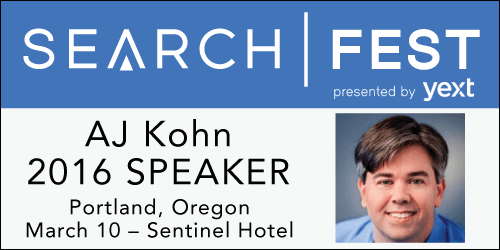A.J. Kohn will be speaking on Semantic Search at SearchFest 2016, which is being held March 10th, 2016 at the Sentinel Hotel in Portland, Oregon. For more information or to purchase tickets, please click here.
 1) Please give us your background and tell us what you do for a living.
1) Please give us your background and tell us what you do for a living.
My background is in marketing and advertising. I have a BA in Marketing from George Washington University and out of college worked for a few fairly prominent ad agencies. I still probably think of myself as a marketer first and draw upon those disciplines frequently.
From there I did some fundraising (an interesting task to sell an intangible) and then moved up to San Francisco for the tail end of Web 1.0 where I got a crash course in online marketing. After the dot bomb nuclear winter I got back into industry doing eCommerce paid search, which ultimately led me to organic search. ‘Why buy the cow when you can get the milk for free?’
In 2007 I founded Blind Five Year Old and began to do consulting work with a focus on organic search. One of my first clients, Caring.com, soon convinced me to become an employee. However, I was working three days there while still doing consulting work the other two days. It was a fantastic way to grow my consulting business.
In 2010 it became clear that doing the consulting work full-time was the way to go since I was over-capacity and was tiring of the 3 hour daily commute, even if it was only three days. Since then I’ve grown the business and been lucky to work with some of the most dynamic start-up teams, counting four top 50 comScore properties as clients at one time or another.
In the last year or two I’ve also begun to work as an advisor, allowing me to bring all of my marketing expertise to interesting and innovative start-ups.
2) You write the most well-thought out posts in our industry and I’m wondering how that’s reflective of your style of consulting.
First off, thank you for the very kind words. And yes, it does reflect my style of consulting. I’m very thorough and I like to ensure that I get things right. I can’t tell you how many times I started writing a post thinking I was going to show something incredible and then through due diligence realize I was wrong or that it wasn’t really all that incredible at all.
I take that same approach when it comes to my client work. If you’re looking for a quick turnaround I’m not your guy. Because I’m going to hunt down every little red herring until I’m sure what I deliver is the most accurate and reflects the best recommendations for the business.
A lot of what I write is documenting my own exploration of a topic or problem. There are frequently times when you’re doing client work and you find a configuration or a problem that confounds you to a certain degree. Sometimes its something native to that client and sometimes it’s something new to the industry. Either way, it’s up to me to figure it out.
I find that you don’t need to have all the answers right off the bat. Saying ‘I don’t know but I’ll find out’ is a very good way to build trust. Hopefully I’ve done that both in my public blog posts as well as my private client work.
Lastly, the presentation is similar. My client work is littered with images to help to communicate the issues throughout the organization and I’ve been known to respond to some threads with reaction gifs .
3) Do you think we’ll get to a point that semantic markup will be superseded by Google’s ability to understand and parse the data with a near perfect degree of accuracy?
That’s an interesting question. I think Google wants to get there. That’s their goal. Because I there seems to be a giant opportunity for JSON-LD spam if people catch on. In some ways I’m surprised it hasn’t been abused more.
So at some point Google is going to want to rely less on what we tell them the markup is and more on what they’re able to understand based on what’s on the page. It’s pretty clear they’re getting better entity extraction and have made strides on the relationships within text.
I think the first step in the process would be for Google to validate that the JSON-LD provided was valid (within a certain confidence score.) So if I tell you the page is about Astronautalis and the song Contrails they’re going to want to validate that the text on the page contains those entities.
But I think they’re still a long way from getting to a high degree of accuracy. My feeling is they’d have to follow through on what Jeff Dean talked about in being able to know that two sentences meant the same thing despite being written in very different ways.
Todd Mintz knows PPC…knows Social Media…knows SEO…knows Blogging…knows Domaining…and knows them all real well. He runs growth marketing for )and is also a Director & Founding Member of SEMpdx: Portland, Oregon’s Search Engine Marketing Association, and he can be found here on Twitter and Facebook.
